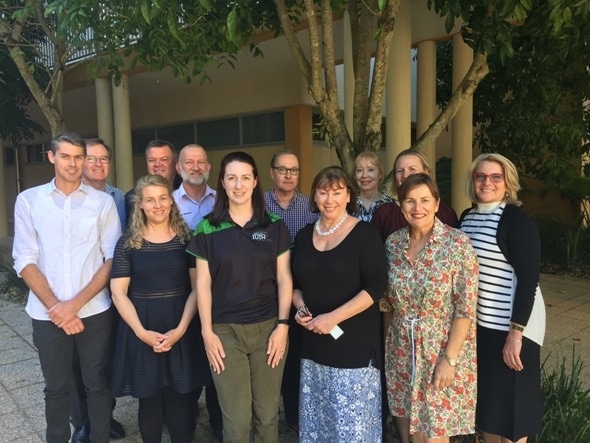Sep 13 2017
Care for children and their families dealing with Fetal Alcohol Spectrum Disorder (FASD) is to be expanded in Queensland following new funding for a Griffith University project.

Front row (L-R) Dr Andrew Woods (University Sunshine Coast), Dr Heidi Webster (Child Development Service, Sunshine Coast University Hospital), Lauren (Ren) Sculthorpe (Institute for Urban Indigenous Health), Prof Sharon Dawe (Griffith University), Prof Mary Katsikitis (University Sunshine Coast), Dr Denise Hatzis (Griffith University) Back row (L-R) Dr Doug Shelton (Child Development Service, Gold Coast University Hospital), Kim Le Gros (Child Development Service, Gold Coast University Hospital) Dr Gerald Featherstone (Kummara Association), Dr Paul Harnett (University of Queensland), Assoc Prof Fran O'Callaghan (Griffith University), Assoc Prof Lucy Burns (National Drug and Alcohol Research Centre, University of NSW)
The news follows the recent International Fetal Alcohol Spectrum Disorder (FASD) Day (9 September) when we are reminded that there is no known safe limit of alcohol consumption during pregnancy. The day is about acknowledging the lifelong physical, neurological, developmental and behavioral problems for children if their mother drinks alcohol while pregnant or breastfeeding. These problems are proven and are collectively known as Fetal Alcohol Spectrum Disorder.
A consortium consisting of the Gold Coast and Sunshine Coast University Hospitals, Institute for Urban Indigenous Health, Kummara Association, the University of the Sunshine Coast and the University of Queensland is being led by Professor Sharon Dawe from Griffith’s Menzies Health Institute Queensland.
This will allow for the expansion of the two existing QLD FASD diagnostic clinics to provide accurate assessment and support of children who have had prenatal alcohol exposure. With consortium partners, there will also be an opportunity to provide support in the community and across schools.
With a funding of $1.37m from the Australian Government Drug and Alcohol Program, the program will allow for expansion of the two FASD clinics based in the Child Development Service Gold Coast led by Dr Doug Shelton, Southport and the Child Development Service led by Dr Heidi Webster, Sunshine Coast, and provision of multidisciplinary assessment, diagnosis and follow-up for children and families.
“The expansion of these clinics also allows us to provide services to younger children aged 3-7 and embed a pathway of care that brings together key stakeholders who can refer children to the diagnostic services,” says Professor Dawe.
“Early diagnosis and support is essential for children with a FASD. Early to middle childhood is a time when children learn important foundational skills around managing their own behaviors, learning to plan activities and follow more complex instructions. These skills are essential for success in school and life. Children with a FASD need extra help in developing these skills and there is growing evidence that supporting children and their families at this critical time can help reduce some of the damage that has occurred due to prenatal alcohol exposure.
“We are excited about the potential to improve foundational skills in children and to work with carers and parents to support their children’s development.”